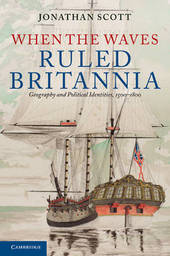
|
When the Waves Ruled Britannia: Geography and Political Identities, 1500-1800
Paperback / softback
Main Details
| Title |
When the Waves Ruled Britannia: Geography and Political Identities, 1500-1800
|
| Authors and Contributors |
By (author) Jonathan Scott
|
| Physical Properties |
| Format:Paperback / softback | | Pages:236 | | Dimensions(mm): Height 229,Width 152 |
|
| Category/Genre | World history
British and Irish History |
|---|
| ISBN/Barcode |
9780521152419
|
| Classifications | Dewey:911.41 |
|---|
| Audience | | Professional & Vocational | |
|---|
| Illustrations |
7 Maps; 1 Halftones, unspecified; 1 Line drawings, unspecified
|
|
Publishing Details |
| Publisher |
Cambridge University Press
|
| Imprint |
Cambridge University Press
|
| Publication Date |
24 February 2011 |
| Publication Country |
United Kingdom
|
Description
How did a rural and agrarian English society transform itself into a mercantile and maritime state? What role was played by war and the need for military security? How did geographical ideas inform the construction of English - and then British - political identities? Focusing upon the deployment of geographical imagery and arguments for political purposes, Jonathan Scott's ambitious and interdisciplinary study traces the development of the idea of Britain as an island nation, state and then empire from 1500 to 1800, through literature, philosophy, history, geography and travel writing. One argument advanced in the process concerns the maritime origins, nature and consequences of the English revolution. This is the first general study to examine changing geographical languages in early modern British politics, in an imperial, European and global context. Offering a new perspective on the nature of early modern Britain, it will be essential reading for students and scholars of the period.
Author Biography
Jonathan Scott is Professor of History at the University of Auckland. His previous publications include England's Troubles: Seventeenth-Century English Political Instability in European Context (Cambridge University Press, 2000) and Commonwealth Principles: Republican Writing of the English Revolution (Cambridge University Press, 2004).
Reviews'This witty, allusive and important study illuminates how 'the discipline of the sea' made England an island nation and Britain an imperial power. By showing how British history, politics and identity were formed through and against not only other islands but also Asia and continental Europe, Scott brings postcolonial, transnational and revisionist perspectives into productive proximity to produce a new and tantalizing reading of the languages of power.' Kathleen Wilson, State University of New York, Stony Brook 'By turns rigorous, radical, and rhapsodic, When the Waves Ruled Britannia demonstrates how nautical experience from the English Channel to Australasia defined the possibilities of politics itself. Before Britain could build a maritime empire, she had to learn what her captains from Drake to Dampier called 'the discipline of the sea'. The perilous but tempting ecologies of the oceans demanded that voyagers venture into new realms of skill, practice, and community if they were to make it home alive. Jonathan Scott shows that as they did so, they shaped the culture of an emerging world power.' Adrian Johns, University of Chicago 'This is a very good book. By turns both analytical and funny, serious and engaging, general and personal, learned and allusively creative, each page reveals another facet of Britain's long relationship with the surrounding oceans ... Jonathan Scott, who has made his name as a historian of seventeenth-century ideas, has now set out to delineate just how the waters flowing through Britons' imaginations affected how they saw themselves and their state. The result will fascinate students and their professors alike.' Glen O'Hara, Journal of British Studies 'When the Waves Ruled Britannia provides an excellent survey of the ways in which concepts of insularity and of the sea factored into early modern British political thought ... a major addition to the study of historical geography and to the history of political ideas, and it also represents a significant step forward in historicizing questions of English and British identity in the early modern period.' Tristan Stein, H-Net Reviews 'So much nonsense has been written about British insularity that Jonathan Scott's book comes as a welcome antidote ... He brings to his study a wealth of knowledge about the literature of the seas, exploration and travel accounts, cartography, geography, early marine science, sea fictions, and even the art of seascape ... a very welcome addition to a growing British historiography that is less landlocked and parochial and much more relevant to this global era.' John R. Gillis, American Historical Review 'In this book Scott highlights the geographical component of early modern British political thought and the geographical articulation of its political identity.' Matthew Neufeld, Canadian Journal of History
|